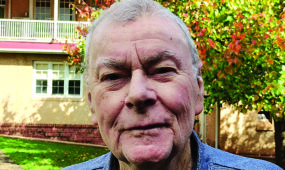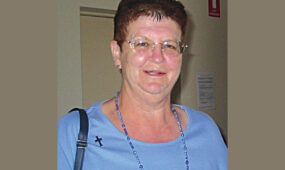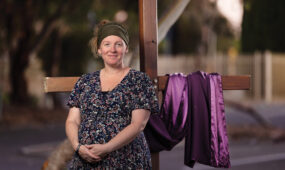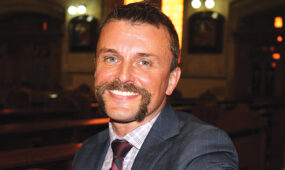Applause for Lithuanian community musician
People
From listening to her immigrant parents and their friends sing Lithuanian songs late into the night to playing the organ every Sunday at St Casimir Chapel, music has been a big part of Nemira Stapleton’s life. The 2024 Order of Australia Medal recipient shared her story.
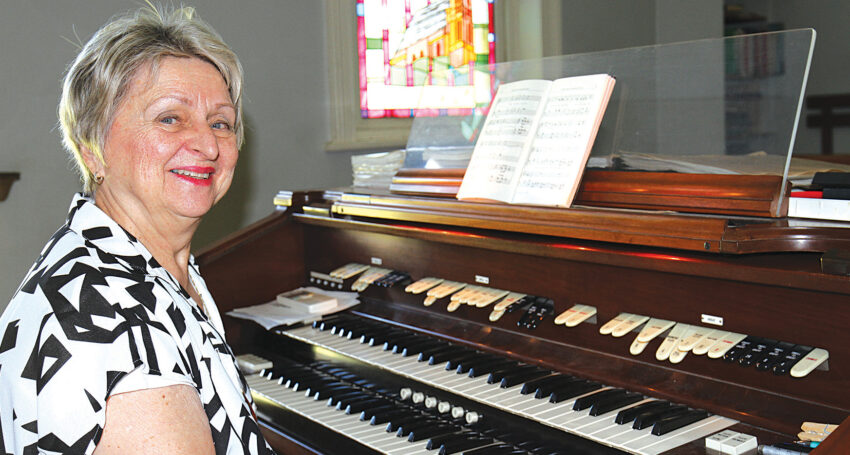
Nemira Stapleton was only 21 years of age and in her second year at the Elder Conservatorium when she was asked to take over as conductor and organist for the Lithuanian choirs in Adelaide.
The previous conductor was from Lithuania and was in his late 60s when he retired from the St Casimir’s Choir as well as the Lithuanian Community Choir which had about 60 singers.
“At that time the chapel choir had about a dozen people. I was just into my music degree and I thought I can’t take on both,” Nemira recalled.
Advertisement
But the church choir quickly grew and soon she was leading a large group of singers, most of whom had honed their craft in Lithuania and had “these gorgeous voices, great booming bases and soaring sopranos”.
“We were doing six part/voice Masses, we had a lot of priests and other noteworthy visitors coming over to visit from Europe and America, and so we were able to do a lot of good singing then,” 77-year-old Nemira (pictured) said.
“They were all older than me but because I was at the Conservatorium I guess I was kind of equipped, and I had been playing since I was 12 and performing in youth concerts.”
Soon she became choir master of the Lithuanian Community Choir as well. There was plenty of rivalry between states with most of the conductors highly accomplished musicians from Lithuania. Nemira said Adelaide was regarded at that time as the best in Australia. Performances at arts festivals around the country were keenly observed with critics reviewing their performances in the Lithuanian newspaper.
Nemira’s music career began at St Joseph’s School, Lower North Adelaide, where she was taught piano by Sr Liguori.
The school was located behind St Mary’s Church and Sr Liguori also encouraged her to play the harmonium in the church which helped when she later played the organ for the Lithuanian choir.
But her love of music began in the home where her immigrant parents would sit around the table and sing Lithuanian folk songs long into the night.
“I’d be curled up on the sofa or reading a book and would listen to them sing,” Nemira said.
“My dad had a lovely baritone voice and could play the piano by ear but I later realised that he stopped playing after I started learning.”
Nemira was two when she arrived in Australia with her parents, Lidija and Napoleon Masiulis, who had fled Lithuania in 1941 as Russian troops took control of the Baltic nation.
They took their chances in Germany and spent the rest of the war in a labour camp, then found accommodation in a private home in Bavaria, where Nemira was born, while they awaited resettlement in Australia.
Advertisement
Lidija was Russian Orthodox but being in the predominantly Catholic Bavaria she was happy for Nemira to be baptised. Coincidentally, the priest who baptised her later turned up in Adelaide as the chaplain to the Lithuanian Community.
“My parents couldn’t believe it when they heard that the next priest coming to Adelaide was Fr Spurgis,” she said. “But then they saw a photo in the Lithuanian paper and they knew it was him.”
On their arrival in Australia, the family spent two years in a migrant camp in Bathurst and then settled in Adelaide where, a year later, Lidija’s parents joined them.
Together they purchased a house at the end of Melbourne Street. “The little Josephite school behind St Mary’s was full of migrants,” she said.
Her grandmother took in boarders and the family grew their own vegetables and planted fruit trees.
“I remember rows of strawberries, chickens and ducks; we were almost self sufficient,” Nemira said.
Her father had a good job in the railways in Lithuania but ended up doing manual work at places like the Amscol factory. Lidija worked at John Martin’s in the lingerie department and was called on to be a translator for anyone with a European accent.
Initially the Lithuanian community worshipped at a church in Pirie Street or at St Patrick’s Church but Nemira’s family mostly attended St Mary’s. It wasn’t until she was in her late teens that the Lithuanian community took over a school building in Third Avenue, St Peters, and converted it into a chapel, a large community hall and a school for young children to learn the Lithuanian language and culture.
Nemira continued her music lessons as a student at St Joseph’s High School (now Mary MacKillop College) at Kensington.
At the age of 16 she began accompanying Lithuanian singers and she continued to do so for many years, often travelling interstate with artists visiting from overseas. She was the accompanist for the Lithuanian Men’s Octet and Lithuanian Women’s Quartet.
Before gaining entry to the Conservatorium, Nemira worked as a lab assistant at Enfield High School for a year and it was there that she first met her future husband,
John Stapleton.
Her eventual career as a music teacher took her to a number of schools around the state, including 11 years at the newly established specialist music school Marryatville High.
“I loved it, the kids were fabulous and just ate stuff up – some have ended up in orchestras around the world,” she said.
Except for a two year-break after she gave birth to her daughter, Aurelia, Nemira taught music in schools until she retired.
With Aurelia now living and working as a doctor in Sydney, and John having died suddenly five years ago, the Lithuanian community has been “family” to Nemira.
“It really helped with the grieving process,” she said.
“You could go nuts if you stay within your four walls and have nowhere to go.”
As well as her involvement with the choir, Nemira is the community’s events coordinator.
Easter is a busy time for the community, starting with the decorating of eggs on Palm Sunday weekend and then the Easter Vigil Mass followed by family gatherings on Easter Sunday.
While the church choir has dwindled to six people, the community choir is growing with about 22 members, some of whom will travel to Lithuania in July for the 100th anniversary of the Lithuanian Song Festival, a week-long event held every five years.
“It’s my first one; it’s a big deal with choirs from all over Lithuania auditioning. Every major city in America has a community choir and a lot of them travel over; they publish the repertoire and you have to audition but somehow we managed to avoid that,” she said.
Locally, the community is preparing for a national arts festival being held at St Casimir’s in late December. Nemira is planning to teach songs to young children at the Lithuanian school so they can perform as well.
But first on her list of significant events is the presentation of the Australia Day honours at Government House in April.
“I think it’s taken all this time to sink in,” she said of the recent news.
“I got a bouquet of flowers from the choir and at the Lithuanian House the choir master called me out and presented me to the audience…they made a bit of a fuss which in retrospect was really nice.”



